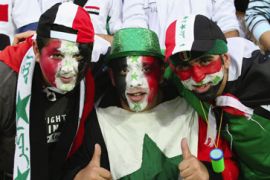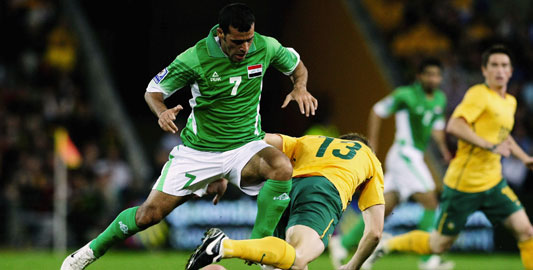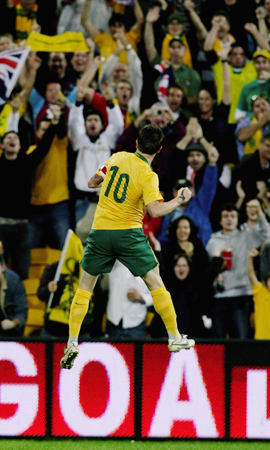Iraqi football fans shoot for unity
Their nationalism surges as the team takes on Australia in a World Cup qualifier.

 |
| Australia beat Iraq 1-0 in the first leg of their qualifying matches on June 1 in Brisbane. Iraqi fans in Abu Dhabi are hoping their side will regain the upper hand [GALLO/GETTY] |
Omar Ibrahim has been waiting for today’s football game between Iraq and Australia for months.
The two teams are to clash in Dubai as part of their qualification games for the Fifa World Cup in South Africa in 2010. Australia beat the Iraqi team 1-0 in a tense match in Brisbane on June 1.
“When I saw the date and venue, my calendar lit up,” says Ibrahim who recently moved to Abu Dhabi from Toronto, adding yet another member to the growing Iraqi community in the Gulf.
More than 10,000 Iraqi fans are expected to cheer their team in the stands of the Al-Ahli stadium today as part of a last ditch effort to support their national squad in what has been a difficult qualifying campaign for the Asian Champions.
River lions
To most Iraqis, however, football has little to do with the antics on the pitch and more to do with the hopes they pin on the national team to mend the destruction of their country.
During these times, the successes of the national team have emerged as the only positive developments in what otherwise has been a disaster.
This has compelled many Iraqis to see the sports team as a major part of their national identity.
“They are part of my roots, in fact, they are who I am, and I take that everywhere with me,” says Sama Al-Naib, a 23-year-old Iraqi living in the United Arab Emirates.
She, along with Ibrahim and a score of Iraqi youth, have been at the forefront of organising a community initiative to support their team, referred to affectionately by Iraqis as the Lions of the Two Rivers.
“It is natural for Iraqis to conflate the successes of the national team with the aspirations of a people wanting to be free,” comments Hazem Jamjoum, an Arab cultural expert and political scientist.
Currently conducting a study on the culture of media under occupation, Jamjoum warns, however, of the dangers of escapism during times when the Iraqis, “need to remember that American destruction cannot be miraculously reversed by the touch of a ball”.
He also adds that “for many Iraqis who supported American intervention, namely the business elite, the team is dubiously being touted around as a sign of reconstruction success”.
Impetus for change
But many Iraqis, regardless of their political leanings, are still adamant that the team can be an impetus for change in the war-torn nation.
“What we need is unification,” said Al-Naib who helped paint 25-metre signs into the early hours of the morning in an underground parking lot in Abu Dhabi.
These large banners are to be showcased in today’s game and will carry slogans like “One Iraq”, or “One Goal” to encapsulate the community’s concerns about the imposed sectarian divisions emerging in the country.
For Ibrahim, his evening was spent orchestrating the delivery of hundreds of tickets to eager fans across the Emirates after a few tense days of waiting for the Iraqi Football Association to print and price the stadium passes.
Despite a late night, dozens of young Iraqis like Al-Naib and Ibrahim will make their way to the stadium several hours before kickoff and situate themselves in the scorching heat.
“We have prepared busses, flags, and posters for the fans,” says Ibrahim as he neatly folds dozens of Iraqi flags and places them carefully in the back seat of his car.
Australian powerhouse
 |
| Harry Kewell jumps for celebration after scoring the winning goal against Iraq last week |
Face paint, lucky socks and a worn-down Iraqi football jersey will make up today’s arsenal of tools as this young and energetic Iraqi will undoubtedly hope for a win against an Australian side that is considered to be an Asian powerhouse.
Ibrahim, an avid Iraqi percussionist, intends to lead the fans into a frenzy using traditional instruments like the zanboor. He sees his role in preparing for the match as part of his duty towards Iraq, and aspires to play a greater role with Iraqi football and community organising in general.
“I have never lived in Iraq, but for those two hours today, my heart will be in Baghdad, with my people,” he told Al Jazeera.
The Iraqi national team has not regularly played games at home for decades. Wars and sanctions have proven to be insurmountable obstacles between a nation obsessed with the beautiful game and a team that cannot stop making miracles out of nothing.
Instead, Iraqi football has been forced to play home games in cities like Doha, Amman, and for tonight, Dubai.
But for the Iraqi footballers themselves, their fans have been present everywhere and given them a glimpse of a home they long for.
“The fans mean everything to us,” said Nashat Akram, an Iraqi star mid-fielder who is expected to play a major role in today’s game.
“We dream of playing in the People’s Stadium in Baghdad,” he added.
What remains to be seen is whether success tonight on the field will actually translate into better lives for millions of Iraqis.